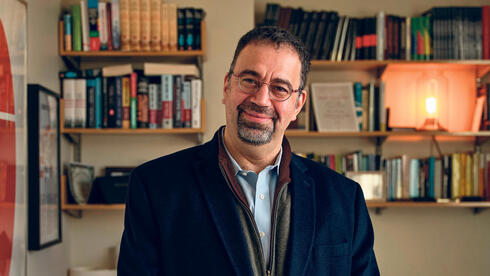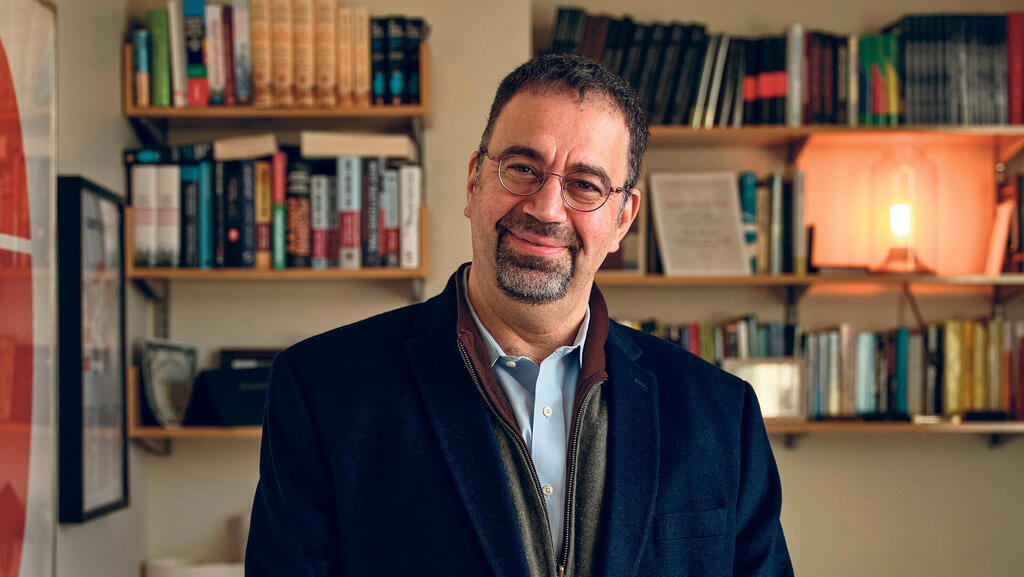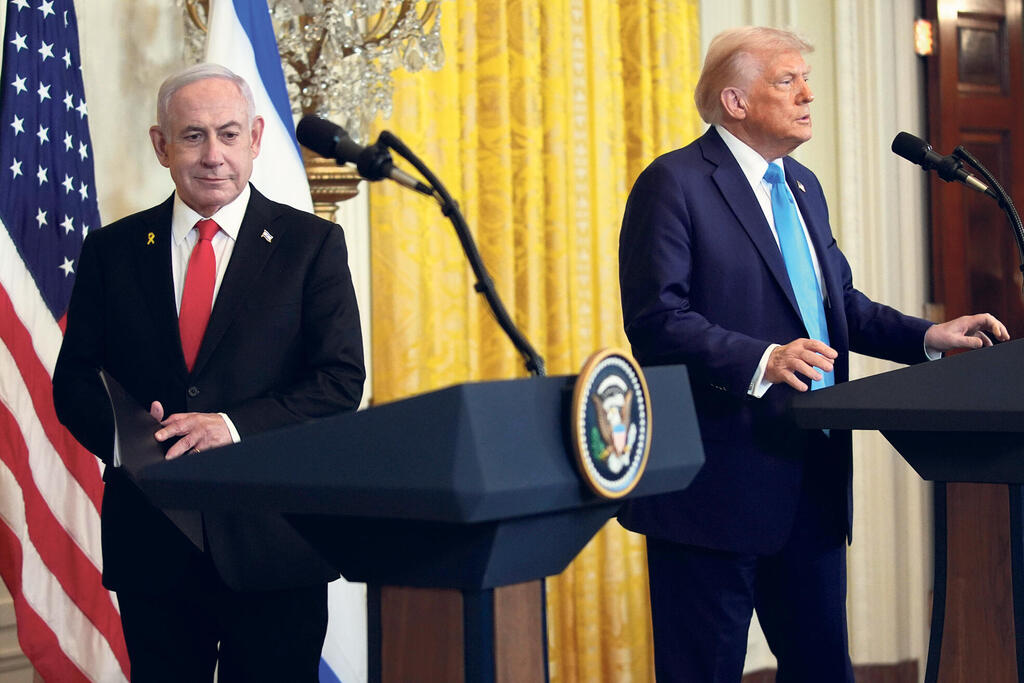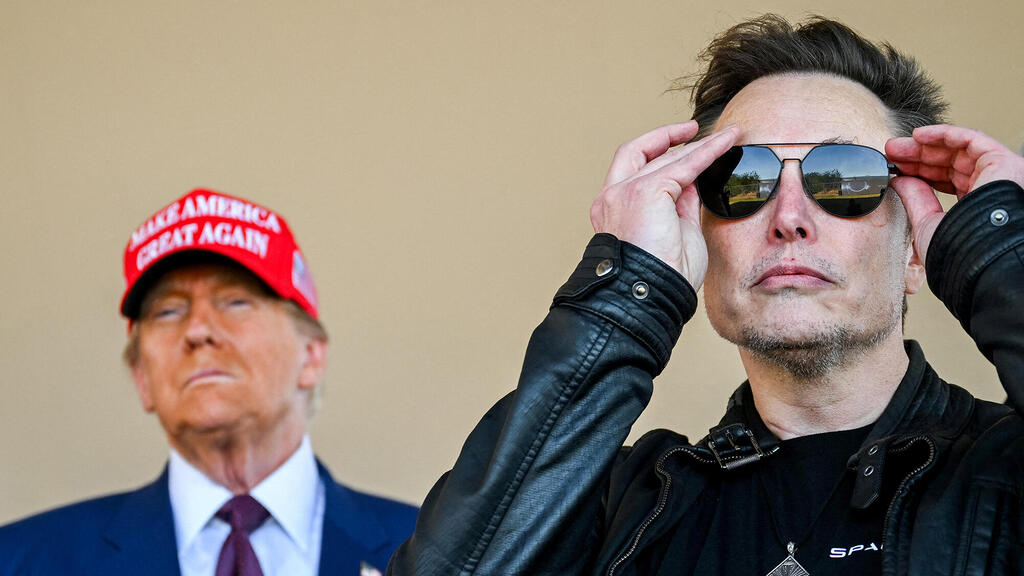
Interview
Nobel laureate Daron Acemoglu: "Israel and the US will be very heavily hit economically if they weaken their institutions"
The MIT economist, fresh off his Nobel Prize win, warns that democracy is essential for economic success. He highlights growing threats to institutions in the U.S. and Israel, comparing Trump and Netanyahu’s erosion of checks and balances.
Daron Acemoglu
(Credit: Stream)
Professor Daron Acemoglu of MIT is considered one of the most important, prominent, and widely cited economists of our time, and it seems he has already achieved nearly every award, title, and accolade. The pinnacle of his recognition, of course, is the Nobel Prize in Economics, which he received two months ago in Stockholm alongside his two research partners.
It is worth listening to Acemoglu, 57, a Turkish-American of Armenian descent, because today, few academics or researchers have as deep a mastery as he does of the key issues in international political economy and the impact of political and economic institutions on major macroeconomic variables such as growth, economic development, and inequality.
What worries you most about the Trump administration, trade wars or multi-billionaires running the world's largest economy?
“Everything about the Trump administration worries me. It's really impossible not to be alarmed if you have studied institutions because you've seen so many countries become overconfident in their institutions or unable to contain people who attempt to undermine democratic norms, democratic practices, checks and balances, and Trump is doing all of them. Countries like Israel, which is also having its own problems of the same sort, and the United States actually depend much more on institutions than simpler economies that are, say, agricultural or just focus on the manufacturing of a few products.
“What makes both the United States and Israel economically dynamic is innovation, new technologies, new experimentation, new explorations. These very strongly depend on institutions that both give people certainty that they are going to be able to enjoy the fruits of their success, that they can rely on a legal system, that they can rely on finance to scale up, that it's not going to be corrupt. It's not going to be completely blocked by monopolists and incumbents. All of these things are now being changed in the United States.”
Americans are not fighting for democracy
Acemoglu does not place the blame solely on Trump for the decline, as he sees it as a process of continuous erosion. “The thing is that we're not even sufficiently alarmed about it. Netanyahu is trying to do the same and has been doing the same for a while. But when he threatened the independence of the judiciary two years ago, Israelis poured into the streets and protested and had it not been for October 7, Netanyahu's government would have fallen. But the Americans are not doing that at the moment. There is a complacency partly because people were upset by some of the policies of the Biden administration and they have accepted another Trump term. But we are going through very dangerous waters.”
Are you suggesting that Trump, like Netanyahu, is also pursuing judicial coup?
"Netanyahu has some of the same instincts as Trump that he's trying to weaken institutional checks on him. He's willing to do many things to remain in power and he is fostering corruption and extremism in order to do so. So those are parallel with Trump. But Trump has an even wider agenda and aspects of his agenda that I are even more threatening to these institutions. So the fact that, for example, he has become so much controlling over the business to tech sector and he has brought in people like Elon Musk into his administration are symptoms of that broader attack on American institutions.”
Do you think that America can prosper without being democratic anymore?
“Absolutely not. The same goes for Israel.”
Acemoglu won the prestigious Nobel Prize in Economics in 2024, along with his research partners, Prof. Simon Johnson (MIT) and James A. Robinson (University of Chicago), “for studies of how institutions are formed and affect prosperity” according to the prize committee. The committee further stated that the researchers "have demonstrated the importance of societal institutions for a country’s prosperity. Societies with a poor rule of law and institutions that exploit the population do not generate growth or change for the better. The laureates’ research helps us understand why."
This marks a significant breakthrough, as the researchers argue that economic outcomes—such as growth, foreign investment, and productivity—can be explained by non-economic factors, including the independence of institutions (such as the judiciary), the strength of the rule of law, the distribution or concentration of power within the executive branch, and the degree of separation of powers, among others.
The three researchers tackled one of the most complex yet fundamental macroeconomic questions: what drives economic success at the national level?
Do you still believe in the theory that won you the Nobel Prize?
“Absolutely, 100%. I still believe in my theory. Of course, take that with any skepticism you want, but no, I 100% believe that both Israel and the United States, two economies that depend on innovation in technology, new products, and new services will be very heavily hit economically if they weaken their institutions.”
Do you have an idea of what Trump is intending to accomplish? Do you really believe that he intends to do everything that he's promising, like deporting millions of immigrants or seizing control of the Panama Canal and Greenland?
“It's a bit hard to know. Trump, like Netanyahu, is mostly motivated by power. He wants to stay in power and obtain more power and shape things in his image, in his agenda and in the process, he also wants to enrich his family, much more so for Trump than Netanyahu, probably. And the more he becomes unconstrained by institutions, the more you see sort of strange instincts, because that's actually a very common thing. You see that with a lot of other politicians around the world, if they are constrained by their own party, by opposition, by the media, they stay away from crazy ideas. But the moment you'll start lifting these restraints, many of them start going into crazy agendas like Erdogan in Turkey or Duterte in the Philippines.”
How does it work with Trump?
“Trump fancies himself as a negotiator and it is true that he has some strategy for negotiation that other presidents didn't because they did not think that was an acceptable way of dealing with international partners. So I think some of the bluster is threats in order to get something else out of them. So in the case of Panama, I think rightly perhaps he was worried that Panama is part of the Belt and Roads initiative, which puts it under the sphere of influence of China. And now with those threats, he actually made Panama leave that initiative. So, I think there was a better way of achieving that. And I wonder how other administrations haven't paid attention to it.
“And there is some indication that it may be the same with Canada and Mexico that the 25% tariffs were sort of threats that now he may withdraw if they are sufficiently compliant. But, the problem with these sorts of things is that they sometimes get out of control either because what he demands is not feasible or it escalates in one way or another.”
And what is the result at the end of the process?
“Trump is constantly questioning people's beliefs in sound, stable institutions. The world benefits from trust in institutions. They have been damaged well long before Trump. But he damages it further by withdrawing from the Paris Accord, from The WHO. He damages it by threatening NATO. He damages it by threatening the European Union and of course he damages domestic institutions. So people's beliefs that they can actually make investments in new innovation, new technologies, new products becomes shaken when that happens."
How dangerous is this? could it develop into a world war?
“I don't foresee a physical war at the moment. There are three hot areas in the world: The Middle East, you're in the middle of that, Ukraine, and I think the most dangerous place is Taiwan. These areas have become much more unpredictable, unfortunately, since October 7. So I would not rule out escalations in one of those areas, but I don't foresee a world war.”
The concern is heightened because when examining Trump's inaugural address at the Capitol, he mentions other regimes from different times: "We will become the envy of the entire world," "America will soon be bigger, stronger, and more extraordinary than ever before." Acemoglu remembers this speech well, and he says: "I also remember other leaders who said similar things, and I have a feeling that we are remembering the same leaders."
Trump said, "We will build the strongest military that we have ever seen".
“Regarding the military, he's a bit of an enigma because he also says he wants to withdraw the troops from around the world, which would be a good thing. I mean, at this point, I don't think having troops in Syria is so important for the United States. Why should the U.S. have troops in Syria?”
The dispute within the U.S. between the Republicans and Democrats, and its underlying currents, are of great concern to Acemoglu. And so is Trump's overwhelming victory. "The Democrats did not deliver the goods," he explains, "they increasingly moved towards an extreme cultural liberalism that the American public does not want. The Democratic Party was also complicit in the social engineering that took place in universities, non-governmental organizations, and local governments. Things were heard like, 'We are going to change your language,' or 'We will allow this speech but not that speech.' And I am mainly referring to universities in the U.S. that once prided themselves, and rightly so, on being a beacon of freedom of expression, and have become the complete opposite.
"I can't imagine that in the UK, for example, where I did my PhD, a faculty member would feel this enormous pressure that there are things that are allowed to be said and there are things that are not allowed to be said. The same holds for universities in the United States when I first arrived. So it is clear that Trump's attack on universities is exaggerated, but it is absolutely true that American universities have become systems where you have to write a DEI statement ("diversity, equity and inclusion") in order to be considered for a job. And if you said anything that stood outside of the line, you are not considered. This is not something you expect from a democracy nor from institutions of free learning and free thinking.
"There were progressive mayors who took over and simply collapsed under the Biden administration, which did some good things of course. They made the regulation so burdensome that it became simply impossible to do anything. In the US, sometimes adding a section of a bridge takes many years just because of bureaucracy, and only part of it, if any, is related to safety issues. This atmosphere created a feeling among the public that the government was not functioning. And they blamed the Democratic Party because it was the government in office but also because it is the party that symbolizes the government more than the Republican Party."
Mixed feelings in Israel towards Trump
The obvious question after the political analysis is how to fix the left. And Acemoglu has a firm answer to that. "What Democrats needed to do was to return back to their working class roots, stand for workers. They didn't do that. Democrats lost it and American voters elected Donald Trump fully knowing that he's a convicted felon, he's somebody who attempted a soft coup, that he's mired in corruption and various other misgivings. But their reaction to the Democrats was strong enough that they put Trump in power and now they're going to suffer the consequences.
“In four years time, perhaps we can repair the damage that Trump has done. Perhaps. I'm not sure we can. Some of it will be permanent. But for that to happen, a Democratic Party needs to come to power, and the current Democratic Party cannot come to power.”
Do you have a recommendation for Israel that is also torn apart and recovering from a difficult war?
“The situation in Israel is very different. Also the Israeli left is very different. Israel demographics are very different. Israeli demographics have changed so much that the problem of the left is much harder in Israel. But this war has taken a terrible toll on everybody. It's taken a terrible toll on the people of Gaza. And the fact that we don't emphasize that enough is not good. The people of Israel have taken a big toll not just because of October 7th, but because of people going to war and their whole lives being upended. So the war needs to end, but then how do you rebuild after that? I don't know.”
Acemoglu understands that the Israeli democratic-liberal camp has mixed feelings about Trump. On the one hand, you can see what the American president is doing to the world. On the other hand, even before he actually entered the White House, he pushed for an end to the war and the return of the hostages, more than Netanyahu did over many months. He has no answer to some of the absurdities. "Biden did some important things, but he was very ineffective in both Ukraine and Israel. The fact that he supported the expansion of the war, but he did not have Netanyahu's trust and couldn't really steer Netanyahu was just very counterproductive. Regarding bringing the hostages back and getting a ceasefire, I don't understand much. I understand some of the dynamics of the Biden administration, but I really don't understand what went on with Blinken and Biden and Israel, and how Trump came to power and this happens. I just don't understand it.”
And what do you think of Trump's surprising plan to evacuate Gaza?
"It's a crazy plan and it will not go ahead."
Not only in Gaza, Trump has declared a policy of deportation from the U.S. and his attitude towards immigrants is aggressive. You yourself are an immigrant and you brought something exceptional to the U.S. when you received the Nobel Prize.
“I have my own views on immigration, but then there are people's views. There is a symptom as well that for a long time in Europe and in the United States, both politicians from the left and the right did not engage with people on immigration, did not even acknowledge or recognize the concerns that people had about some aspects of immigration, some of it illegal, some of it legal. And that wasn't a good strategy. It's not a good strategy in Europe. We're seeing exactly the same backlash in Europe. We'll look at AfD. I don't think AfD is a Nazi party, but it's a far right party. So in Germany, a far right party is getting 40% of the vote in some areas. That should alarm people. But the fact that AfD has risen so much is exactly because topics like immigration were off the agenda.”
And can such an issue be ignored?
“I don't think in a democracy you can do that. You have to sort of meet the voters halfway. So the evidence, as far as I can see, is that immigration has economic benefits to the United States in many dimensions, but it does create some pressure on wages and it does create some cultural difficulties, some assimilation difficulties. But if a sufficient fraction of the voters are very against illegal immigration, even if some of it is justifiable on humanitarian grounds, the government will have to meet the voters halfway or more than halfway and take measures and certainly not treat immigration as a taboo topic that cannot be mentioned. From now on, my guess is that even when a Democratic administration comes, they're going to be much more cautious on immigration. And that's probably a good thing given where the American public is.”
So will Trump succeed in deporting millions as he promised?
“No, I don't think that Trump can deport millions because the state capacity to do that is not there. You will need many more people devoted to more detention facilities. But he'll deport a lot of people. Immigration service will do raids. Some of it will be for show, but the big issue for the United States is to control its borders, as is for many other countries. And illegal immigration. Trump will probably be able to do more on that than Biden was willing to do.”
AI will make the world less equal
Another area of research that has been preoccupying Acemoglu recently is related to automation and AI and how they affect equality. Although it is difficult to see how these technological developments reduce inequality.
“There has never been any theory or empirical evidence that supports the claim that automation reduces inequality. There are circumstances under which automation can increase productivity and it can increase wages, but it is always a factor that creates more inequality because it's taking away jobs from some people and not others. And if you look at the evidence from the U.S., it shows it's one of the most important factors in explaining the huge increase in inequality in the United States. If we go into more and more automation with AI, I think this is going to be a very unequal world. And that is a world that OpenAI, Sam Altman, Elon Musk and Google want, or don't don't mind, but I don't think that's what we want as the general public.”
Do you utilize ChatGPT in your work or personal life?
“I don't, I've used it in the past and now generative AI tools are incorporated into many of the apps or programs that we use. So I'm exposed to it. It's not bad, but it can be much better. And for it to be much better, we need to develop it as what I call a "pro human technology". A technology that serves humans, provides them reliable, better information that makes them better decision makers. That's where we're failing.”
Dangerous times in Israel
The Connection between the October 7 failure and the weakening of democracy
Professor Acemoglu is well acquainted with Israeli reality, as he is considered one of the most prominent researchers of right-wing populism. In an interview he gave to Calcalist two weeks before Netanyahu's victory in the last elections, he defined Netanyahu as the “founding father of right-wing populism”. And he knows how to draw a connection between the failure on October 7 and the weakening of democracy and the judicial coup in Israel.
"Some of the accounts I read suggest that the military was focused on other things, not the Gaza border. They were defending settlers who shouldn't be there in the West Bank,” Acemoglu says, referring to the forces sent to secure MK Zvi Sukkot's sukkah. He then added. “And I understand some of those serving in the IDF were demoralized because of an attempt by Netanyahu on going through with his judicial reform and their focus wasn't on defending where there was a real threat.
“Israel has always prided itself in terms of its intelligence gathering and knowing where threats were going to come to the country. And this was a blatant failure. And the fact that the person at the top is not getting the blame for it is striking."
Netanyahu is not associated with failures, he is only responsible for successes.
“Exactly. That is another thing your leader has in common with Trump.”
So apparently none of them read your research. Netanyahu continues to weaken democracy and thereby harms the economy.
“I think for all governments around the world, it is time to strengthen institutions and be sure that democracy can deliver. Democracy is in crisis everywhere around the world, in Israel, in the UK, in the U.S. and France. If you ask people, their support for democracy is much lower. People are much more polarized and they don't want to compromise with the other side. Those are dangerous times for democracy and I don't see any happy future for humanity without democracy.”
And yet, Netanyahu and Trump were elected democratically. In the case of the U.S. in the last election, cities that had been democratic for 60 years elected Trump. What happened there?
“My view is that Donald Trump didn't win this election, the democrats lost it.”
The candidate who faced off against Trump was not particularly impressive.
“Kamala Harris ran a very bad campaign just focused on abortion and nothing of substance.”


















